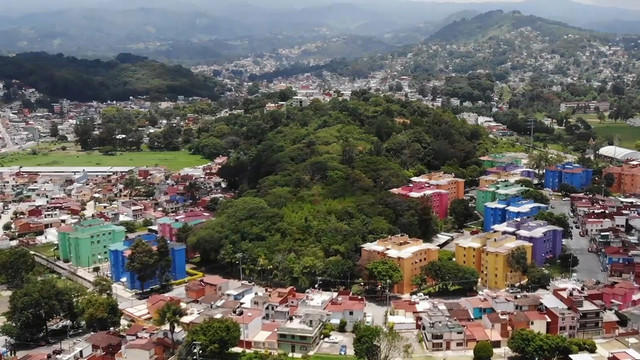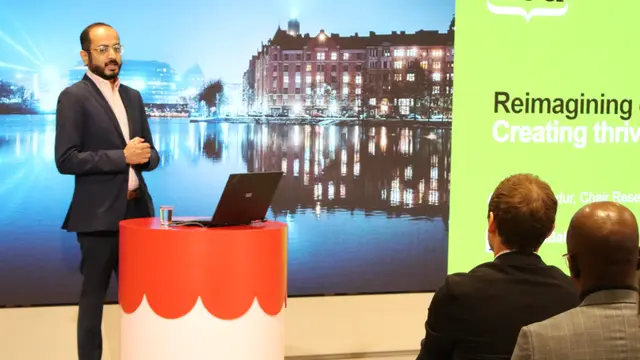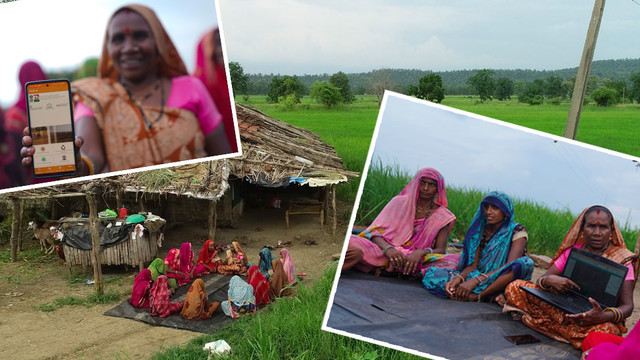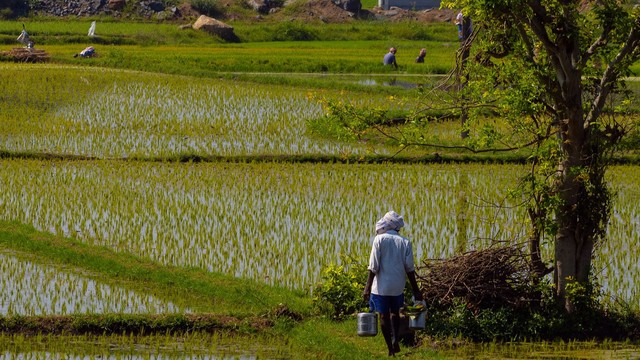Can mitigation deliver better cities in the global South? full transcript
Host [00:00:00] You are listening to Make Change Happen, the podcast from IIED. In this episode guest presenter and IIED principal researcher Anna Walnycki explores how climate action, in particular mitigation, can work for the poorest living in cities in the global South. Anna is joined by expert partners from Argentina and India and we’ll also hear a playful dialogue between IIED urban research colleagues about the current arguments around mitigation in urban development.
Anna Walnycki [00:00:31] Welcome to our podcast, Make Change Happen. My name is Anna Walnycki and I’m the principal researcher here at IIED. I’m taking over from our regular host, James Persad, for a specific episode that’s going to explore how climate action – in particular mitigation – can work for the poorest living in cities in the global South.
So IIED continues to support partners who live in communities on the frontline of climate change, who are playing a vital role in promoting equitable adaptation at the local level. And we believe that more climate adaptation finance and resources should be put into the hands of local communities, local governments, social movements, federations of the urban poor. Those that are living in slums in informal settlements, so that they can adapt to the impact of climate change such as flooding, extreme weather events, droughts. Our research has demonstrated that this leads to outcomes that best respond to local needs. However, a sizeable proportion of climate finance is focused on decarbonisation and mitigation. Today, we want to explore the scope that climate mitigation actions have to respond to pervasive poverty, and also contribute towards more just and equitable cities.
So in this episode, with my fellow IIED urban research colleagues Tucker Landesman and Aditya Bahadur, we want to unpick the myth that the urban poor have no role to play in debate or resource allocations related to mitigation in cities, and the planning processes that are focused decarbonising cities or achieving net zero. The urban poor have very low carbon footprints and should not be burdened with the personal responsibility of decreasing their carbon footprints. However, we cannot and must not exclude them from mitigation debates or generation defining decision making.
Then, we’re going to move on to hear from some knowledgeable guests, some long-term partners that we’re working with, on the realities of mitigation in informal settlements. But first over to Tucker and Aditya, who’ll give us a recap of the current debate around linking mitigation and urban development.
[Music]
Tucker Landesman [00:02:42] Hi Aditya.
Aditya Bahadur [00:02:42] Hi Tucker.
Tucker Landesman [00:02:43] OK, I want to run something by you. I know a big focus of your work is on climate adaptation and localising climate resilience while most of my work focuses on kind of mitigating greenhouse gas emissions and low emission development. And I know that for years, IIED and others have advocated that a just approach to climate change requires billions more invested in climate adaptation. I know this money should target the most vulnerable geographies and with meaningful participation of impoverished communities.
But don’t you also think it’s time that these geographies are targets for large-scale mitigation programmes? According to the UN, urban areas consume about two thirds of global energy and are the sites of more than 70% of carbon emissions. On top of this, 90% of urban growth in the coming decades will be in Asia and Africa. Don’t you think a major focus of climate justice should be investing in technologies and practices so that cities in the global South leapfrog over carbon intense development strategies pioneered by Europe and US America.
Aditya Bahadur [00:03:59] I can’t believe what I am hearing. I think you’re way off the mark here. You can’t talk about leapfrogging when, you know, a third of Pakistan is under water and rising tides could wash away the homes of four hundred million people by the year 2100 due to sea level rise. Most of these living in developing countries. And people living in cities across Asia, Africa and Latin America have a fraction of the carbon footprint compared to those living in rich countries.
And let’s not forget that the carbon footprint is a fairly crude aggregate measure where India’s richest man that lives in a 30-storey mansion and a poor slum dweller, they combine to deliver this aggregate figure. So poor people living in cities of developing countries have a minute and negligible carbon footprint. And these urban poor are already paying the price of the climate crisis. And therefore, in my view, climate justice is about recognising that huge carbon disparity exists, and then climate justice should be sharply focused on addressing the vulnerabilities of these poor and vulnerable people, while encouraging more sustainable forms of equitable economic development.
Tucker Landesman [00:05:16] OK, I hear you. And just let me clarify, I do not think that the urban poor should have to reduce their carbon emissions or bear responsibility for kind of global mitigation efforts. But I still think they have a role to play. There’s just so much more money invested into projects and infrastructure that mitigate carbon emissions. So according a report by the climate policy radar, in 2020, 2021, total climate finance reached US$632 billion. Ninety per cent of that targeted mitigation. Ninety per cent. I’m worried that money is largely bypassing low-income communities and possibly even widening the gap between the urban rich and the urban poor. So, what I’m trying to say is, we need to figure out how those investments can also target inequality and reduce poverty while also delivering emissions reductions.
Aditya Bahadur [00:06:23] Ah, so quite different to what I originally thought. You’re not saying that poor people should shoulder the burden of decarbonisation, but that they should be key stakeholders in determining how decarbonisation takes place, and how climate finance for decarbonisation is spent. It’s really difficult to disagree with that, Tucker, so I think we’re on the same page.
Especially because doing this will make it easier to ensure that decarbonisation efforts deliver a range of other co-benefits apart from only abating carbon emissions. You know, like investing in household solar power not only helps reduce emissions from coal-fired power plants in the global South, but also allows poor households to reduce their exposure to blackouts during heatwaves. So it’s a resilience measure as well.
Tucker Landesman [00:07:11] Exactly. I really think this is an opportunity to kind of deconstruct that binary between, oh, we’re either working on adaptation or mitigation, when we know that that difference doesn’t really make sense on the ground.
Aditya Bahadur [00:07:24] I couldn’t agree with you more, Tucker.
[Music]
Anna Walnycki [00:07:29] Thanks Tucker and Aditya. Now we’ve heard the arguments for low income in informal urban communities to engage in decisions and funding allocated for mitigation as part of broader efforts to accelerate climate action. Now we’re going to explore what pro-poor or more equitable climate action looks like in practice. When we started asking ourselves what sort of practical interventions in slums or informal settlements would reduce high urban emissions, or decarbonise cities, and reduce inequalities – so tackle poverty, improve access to housing, basic services such as water, sanitation, energy and improve livelihoods – we noticed a couple of things.
First, there are already civil society organisations and communities and local governments innovating to address climate change and meet unmet basic needs, such as access to water and sanitation. And second, many of these innovations are capturing or reducing some carbon emissions while also dealing with the effects of climate change, as well as building local economies and improving the quality of life for residents. So to hear more about what this looks like in practice and in reality, we’ve invited two of our partners to tell us some more about the realities of working climate action and poverty in cities.
[Music]
Anna Walnycki [00:08:49] Bijal, who’s joining us from Gujurat, would you like to introduce yourself, please.
Bijal Brahmbhatt [00:08:51] Thank you. My name is Bijal Brahmbhatt and I work with an organisation called Mahila Housing Trust. We work with poor women in informal sector, trying to improve their habitat conditions.
On very, very basic issues, the work began on basic issues like water sanitation. But now we have – and housing – but now we have also, you know, moved over to looking at how this housing and this infrastructure can be more climate resilient for poor women.
Anna Walnycki [00:09:27] Thank you. So could you tell us a bit more about what you’re doing to improve low income neighbourhoods in the cities that you’re working in?
Bijal Brahmbhatt [00:09:36] So when we started actually working with poor women, especially on climate change issues, we understood that it is not currently on the priority list because they do, their time is occupied with worrying about their livelihoods or how to get their water connection.
What interested them actually only in climate change was that they did not want their children to live the kind of lives that they were leading, and that’s what really got them interested. What we are doing currently is that we are organising these communities. We are training them to assess their vulnerabilities in terms of climate change, which are slow onset but potential disaster. So, like working on heat stress, which the global South is going to get subjected to increasingly, or air pollution, or say, water scarcity.
So one is training them on what it is, demystifying the science, helping them assess their own vulnerabilities due to climate change, and then helping them make their own action plans. And then probably also working with technologists, scientists to ensure some disruptive collaborations which the women can adopt in terms of using these technologies. And then, you know, also thinking how they can be scaled and working with government. So that's potentially what we do when we work with low-income communities.
Anna Walnycki [00:10:59] Thanks for that. Could you tell us a little bit more about how these interventions support mitigation and people's abilities to adapt to climate change?
Bijal Brahmbhatt [00:11:09] So for example, heat is a given in India and across the global South, and the IPCC has predicted that it's going to be even hotter in areas like us, going beyond 50 degrees centigrade. We started working on something like cool roofs, which the poor can install in their houses because obviously they cannot afford air conditioners.
What we did is we actually trained the women to take the readings after installing the cool roof, the heat readings, and then compare it with the meteorological department readings. And then they understood that the roof was really working and they started adopting the cool roof technology. With this, they actually in Ahmedabad, we had a city heat action plan which was not focusing on cooling at all, it was merely focusing on keeping hospitals ready when people get heat stroke and early warning systems.
So, they then went to the government saying that cool roofing could be a part of the heat action plan and to which the government listened. And now we are working on cool roofs and cooling materials for the entire city. And once implemented and becomes a part of the policy, it will heavily reduce the GHG [greenhouse gas] emissions because of course the electricity consumption will be reduced.
Anna Walnycki [00:12:36] And from your perspective, what are some of the key learnings that are coming out of these interventions in terms of promoting climate action that can also respond to the specific basic needs and poverty in informal settlements.
Bijal Brahmbhatt [00:12:51] So I think the first and foremost is that technologists and scientists really keep some of this phenomena and speak about some of this phenomena in a very, very scientific language. That needs to be demystified through some very creative communication material to these women.
Secondly, we must ensure disruptive collaborations on technologies for, you know, addressing the impacts of climate change. And it's a mutual learning – so the technologists and scientists also have to learn from the poor women. Thirdly, I think providing finance so that such initiatives scale up. And fourth and most important is that these community voices become a part of the government policymaking. I think these are the key learnings.
Anna Walnycki [00:13:41] That’s a really nice example of how much impact a fairly simple mitigation idea can have. And also how women who live in low income urban areas can have a real voice around decisions influencing city-wide change. I'd like to turn now to Daniel Kozak. Would you like to introduce yourself?
Daniel Kozak [00:13:57] Yes, thank you. My name is Daniel Kozak, I'm professor at the University of Buenos Aires, where I am the director of the Research Center Habitat and Energy.
Anna Walnycki [00:14:06] Wonderful, thank you. I wondered if perhaps you could tell us a little bit about the sorts of interventions that are being developed to upgrade and improve low-income neighbourhoods in Buenos Aires at the moment?
Daniel Kozak [00:14:16] Yes, of course. At the moment we are working on an ongoing plan that started in 2016. It is a reorganisation plan which initially didn't consider the environmental dimension, so our challenge is to try and make as possible as we can to introduce this layer, this dimension, especially by making room for green spaces and blue-green infrastructure in the neighbourhood, which is a huge challenge because these are very dense, central neighbourhoods, very impervious, so they are very affected by heat island effects and very prone to flooding.
Anna Walnycki [00:15:05] And how do the interventions and work that you're involved in respond to housing and basic service needs, whilst also accelerating climate action, specifically decarbonisation?
Daniel Kozak [00:15:16] At the moment we are prioritising interventions in public spaces. So basically, we are trying to look for all the opportunities to add more vegetation whenever we can, sustainable urban drainage systems.
For example, the original plan or the ongoing plan has a lot of new passages open because one of the basic ideas was to open up - to ‘sponge’ as it is called in the plan - the neighbourhood, because one of the most acute problems is problems related to respiratory diseases, because ventilation is very poor. So the original plan had the aim of adding more streets and more passages, but initially all these streets were dry, and also didn't have the possibility of blue-green infrastructure and all these ideas that we are trying to bring in.
So sometimes it is possible to plant a line of trees in very few cases. In most cases there's not enough space so we have to come up with more sometimes creative solutions, creating kind of platforms, vertical and horizontal, like vegetated pergolas that can provide shade. And also, whenever we can, we replace impervious surfaces by absorbent soil or different types of semiabsorbent soil and rain gardens.
Anna Walnycki [00:16:50] So working in these established neighbourhoods presents a challenge in terms of even finding space to make decarbonisation interventions?
Daniel Kozak [00:17:00] This is not only a challenge because of the lack of space, but also this involves sometimes intense conversation with neighbours because we have to make sure that everybody is happy with having, for example, a rain garden in the streets.
[Music]
Daniel Kozak [00:17:17] So the real challenge is to create space for these new green spaces in the neighbourhood. That means making room for nature in the city, which is true also for all the city, but particularly in low-income neighbourhoods this is urgent, because this is where the highest levels of overcrowding are found and public spaces act essentially as expansions of the houses and flats.
So this is also the neighbourhoods where there is usually less quality green space per inhabitant and where the feat of remediation, capacity of precipitation, that is the capacity of precipitation to capture pollution and contamination is also most needed, with also the provision of ecosystem services to cope heatwaves, reduce flood risk, etc.
Anna Walnycki [00:18:13] Thanks Daniel. Now, I'd like to ask both of you a couple of questions. Firstly, what do you both consider to be the key challenges in getting communities with relatively small emissions, with small carbon footprints, to consider building methods, upgrading approaches or new types of service provision that also contribute to decarbonisation?
Bijal Brahmbhatt [00:18:40] So to me, what I think in our experience is that because it's not very high up on the priority ladder of the poor, we have to constantly keep giving the messages, constantly have creative communication and be at it all the while, you know, working with these communities.
Again, I think upgrading approaches and building methods should be technically advised to them and also kind of supported with finance. Because the major issue that they face is that they do not get access to finance because their housing is on informal land. So, I think all of these efforts have to be supported with access to finance.
Daniel Kozak [00:19:30] I agree with Bijal. I think probably one of the main challenges is that until very recently this was not part of the conversation and it's definitely not the priorities of the people in low-income neighbourhood, at least the ones in which I participate. So, I think sometimes the way to advance in climate change action agenda is to have, for example, mitigation aims as secondary aims and use the main aims prioritised by the inhabitants of the neighbourhoods.
For example, reducing the flood risk or reducing the heat waves, and at the same time capturing CO2 and creating conditions for adaptation. This is also in line with the latest literature in climate change which makes a call to create synergy between mitigation, adaptation and sustainable development, especially in the global South.
[Music]
Anna Walnycki [00:20:37] Thanks so much. And then just another question for you both. What, in your opinion are the key ingredients that we need now to scale these interventions to make change happen? We've been talking a lot about interventions that exist at local level, but how do you think, what's needed to really scale these interventions to achieve change?
Bijal Brahmbhatt [00:20:59] So, in my opinion, four or five key things we need to do. First of all, in my country and across the global South, I believe that climate action plans are made, but they are made in isolation of the urban development plans - these two plans don't talk to each other. So, so far as urban areas are concerned, I think urban development needs to integrate with climate action planning.
That's the first thing. I think the second most important thing is that currently the poor women who we are working with are actually having no invited space in the government committees and policymaking, so, you know, we have to claim our space. So I think the poor and the communities should have an invited space in the government committees and policymaking arena. Third, I think disruptive collaborations on locally led adaptation need to be financed by the government and recognised as a part of social protection schemes. And all of this has to be accompanied with constant creative communication and messaging. I think these are the important ingredients.
Daniel Kozak [00:22:20] Again, I agree with Bijal. I think there are at least three dimensions in which scaling up should be addressed and this is also very recognised in the current literature. First of all, we have to go beyond the size of pilot projects.
There are a lot of NBS [nature-based solutions] blue-green infrastructure pilot projects but they tend to remain as isolated episodes. So we have to go beyond the scale of this and also to cover more extension. Most of these pilot projects are located in kind of the same locations, which are the locations that have access to this information first of all, and the resources. And also, and this is the most important part, is to conventionalise this approach:
They tend to be considered still demonstrative project, pilot project. So in order to achieve these three dimensions of scaling up, I think that a very important mind shift in governance and in the structures of governance have to take place. There is a very strong path dependency and it is difficult to work multidimensional to bring down silos. We have to think that conventional grey infrastructure has been in place, and all the mechanisms that support and put forward grey infrastructure has been in place, for hundreds of years.
If we include the 19th century beginnings of this type of approach in cities, in the case of fluvial water, the drainage system it’s very clear - the idea has always been to take the water fast and far from the place where the rain falls. So, making this shift and trying to retain as much as possible replicate the mechanisms of the hydrological cycle it takes a lot of effort and a lot of internal changes in the government structure, in the planning structures.
Anna Walnycki [00:24:29] Thank you both so much. It's really exciting and hopeful to hear how these diverse interventions in very different urban contexts are not only responding to poverty and inequality, but also promoting climate action locally that's linking adaptation and mitigation.
I guess my reflections from your reflections are that innovation doesn't always come from engineering firms or architects alone, and instead there are emerging co-produced solutions that have the scope to be scaled and also to develop affordable accessible infrastructure that reflects the local priorities. And these are priorities which contribute to climate action. Without planning processes and solutions that involve local governments and low-income urban communities, it's clear that climate investment - and that includes mitigation investments - will not reflect these needs.
And they do run the risk of exacerbating existing social and economic and environmental injustices. And we've seen this in cities from the global North where environmental investments or climate investments have actually promoted gentrification. So it's really important that decentralised decision-making processes are established with accessible local resources that can be used by local actors to support these processes and enable change to happen at scale. And I’d just like to conclude by thanking our guests for joining us today, Daniel and Bijal, and also my colleagues, Tucker and Aditya. Thank you all for listening.
[Music]
Host [00:26:02] And you can find out more about today’s podcast, our guests and their work, at www.iied.org/podcast, where you can also listen to more episodes. Our work on better cities, at iied.org/urban, will provide some particularly relevant information. You can leave us feedback, or follow the podcast, at soundcloud.com/theiied. For more information about IIED and our work, please visit us online at www.iied.org.

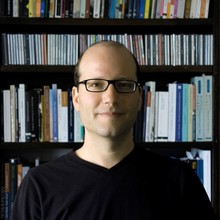

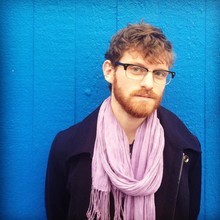

 Soundcloud
Soundcloud Stitcher
Stitcher TuneIn
TuneIn Spotify
Spotify iTunes
iTunes
